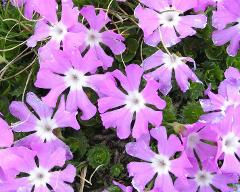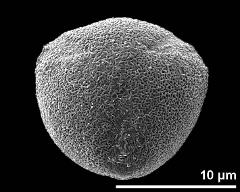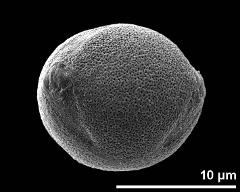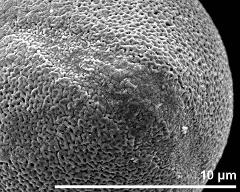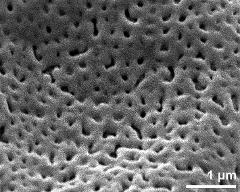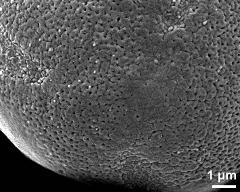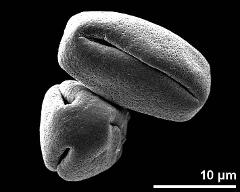Primula minima
Taxonomy: Spermatophyta, Primulales, Primulaceae, Primula
Published: 2005-06-01
Pollen Description
Shape, Size and Aperture
pollen unit: monad, dispersal unit and peculiarities: monad, size (pollen unit): small (10-25 µm), size of hydrated pollen (LM): -, shortest polar axis in equatorial view (LM): -, longest polar axis in equatorial view (LM): -, shortest diameter in equatorial or polar view (LM): -, longest diameter in equatorial or polar view (LM): -, pollen class: -, polarity: isopolar, P/E-ratio: -, shape: spheroidal, outline in polar view: circular, dominant orientation (LM): -, P/E-ratio (dry pollen): prolate, shape (dry pollen): -, outline in polar view (dry pollen): lobate, infoldings (dry pollen): aperture(s) sunken, aperture number: 3, aperture type: colporus, aperture condition: colporate, aperture peculiarities: -
Ornamentation and Structure
LM ornamentation LM: -, nexine: -, sexine: -, SEM ornamentation SEM: perforate, suprasculpture SEM: -, TEM tectum: eutectate, infratectum: -, foot layer: -, endexine: -, intine: -, wall peculiarities: -, supratectal element: -
Miscellaneous
pollen coatings: absent, reserves in cytoplasm: -, cell number: -, Ubisch bodies: absent
Annotations: shape spheroidal to slightly triangular oblate
Author(s) of diagnosis: Svojtka, M.; Halbritter, H.
Pictures
Picture legend
- flower(s), photographer: Svojtka, M.
- slightly oblique polar view - fresh, rehydrated (water) & critical point dried & sputter coated with gold, photographer: Halbritter, H.
- equatorial view - fresh, rehydrated (water) & critical point dried & sputter coated with gold, photographer: Halbritter, H.
- aperture - fresh, rehydrated (water) & critical point dried & sputter coated with gold, photographer: Halbritter, H.
- exine surface - fresh, rehydrated (water) & critical point dried & sputter coated with gold, photographer: Halbritter, H.
- polar area - fresh, rehydrated (water) & critical point dried & sputter coated with gold, photographer: Halbritter, H.
- dry pollen grains - dry, sputter coated with gold, photographer: Halbritter, H.
Literature
- (1937) European bee plants and their pollen. Bee Kingdom League, Alexandria, Egypt : 164 pp
- (1984) A practical pollen guide to the British flora. Quaternary Res Bull Technical Guide I: 1-139
- (1962) Quelques données palynologiques de l'apparition de l'hybridation introgressive. Bot Zh Moscow 47: 1025-1029
- () Pollenformen und Honigherkunftbestimmung. Bücher des Archivs für Bienenkunde, Berlin 2: 1-122
- (1929) Die Pollenformen als Mittel zur Honigherkunftbestimmung. Bücherei für Bienenkunde. Karl Wachholtz Verlag, Neumünster in Holstein X: 1-116, 23 pl
- (1971) Atlas des pollens des environs d'Istanbul. Istanbul Universitesi, Orman Fakultesi publication : 1-330
- (1984) Pollen morphology and heterostyly - a systematic and critical account. Adv Pollen - Spore Res 12: 79-126
- (1993) Pollen exine dimorphism in ten heterostylous species. J Palynol 29: 77-88
- (1986) Claves para la determinación de los polenes de las principales especies melíferas de la Península Ibérica. Orsis 2: 27-54
- (1875) Insects and flowers. Pop Sci Rev 14: 113-125
- (1942) Lehrbuch der Pollenanalyse. Handbücher der praktischen Vorgeschichtsforschung. Verlag Ferdinand Enke, Stuttgart 3: 195 pp
- (1961) Leitfaden der Pollenbestimmung für Mitteleuropa und angrenzende Gebiete. Leiferung 1: 1-63
- (1916) Zytologische und embryologische Studien über die Reihen Primulales und Plumbaginales. Kungl Svenska Veten Handl 56: 1-80
- (1994) Estudios palinógicos en Dilleniidae del sureste de la Peninsula ibérica. In: Polen y esporas: Contribución a su conocimiento, I La Serna Ramos. VIII Simposio de Palinologia (APLE), Tenerife : 35-46
- (1959) Podrecznik Palynologii. metody I Problemy. Warszawa : 1-325
- (1877) Pollen. Hardwicke & Bogue, London : 92 pp, 24 pl
- (1963) Introduction to Palynology. Natur Och Kultur, Stockholm : 198 pp, 18 pl
- (1963) An introduction to a scandinavian pollen flora - II. Almquist & Wiksell, Uppsala : 1-89
- (1961) An introduction to a scandinavian pollen flora. Grana Palynologica 2: 3-92
- (1964) Text book of pollen analysis. Scandinavian University Books, Munksgaard : 1-237
- (1985) Morfología polínica de la familia Primulaceae en Andalucía occidental. An Asoc Palinol Leng Esp 2: 107-115
- (1970) Morphologie des grains de pollen de quelques Myrtaceae et Primulaceae. Vest mosk Univ 6 25: 47-52
- (1890) Beiträge zur vergleichenden Morphologie der Pollenkörner. Breslau (Thesis) : 1-72
- (1832) Beiträge zur Kenntnis des Pollen. Berlin, Stettin und Elbing : 48 pp, 2 pl
- (1898) A travers les pollens indigènes. Bull Soc Hist Nat Autun 11: 217-238
- (1986) Pollen flora of North-West Himalaya. Indian Association of Palynostratigraphers, Lucknow : 181 pp, 29 pl
- (1985) A contribution to the pollen flora of sub-tropical eastern Himalayas as an aid to Quaternary research and aerobiology. Trans Bose Res Inst 48: 87-114
- (1897) Beiträge zur Biologie und Morphologie des Pollens. Sitzber Böhm Ges Wiss Prag Jahrb XXIII: 1-76
- (1842) Observations on the structure of the pollen granule, considered principally in reference to its eligibility as a means of classification. Ann Mag Nat Hist 8 & 9: 92-108, 544-573
- (1925) Nectar producing plants and their pollen. British Bee Journal, London : 1-110
- (1971) Pollen and Spores of Chile. Univ Arizona Press, Tucson : 1-167
- (1972) Pollen flora of Taiwan. National Taiwan Univ, Botany Dept Press : 297 pp
- (1966) Pollen grains of Formosan plants. I. Taiwania 13: 15-110
- (1969) Étude de l'arrangement du pollen dans la tétrade chez les Angiospermes sur la base de données cytologiques - II. Variation dans le nombre d'apertures. Bull Soc Bot Suisse 79: 354-364
- (1958) An atlas of airborne pollen grains. Macmillan & Co Ltd, London I-XVI: 1-112
- (1956) Pollen grains of Japan. Hirokawa Publishing Co, Tokyo I-XII: 1-304
- (1988) Pollen: Illustrations and Scanning Electronmicrographs. Kodansha (Tokyo) & Springer-Verlag : 198 pp
- (1952) Atlas zur Bestimmung rezenter und fossiler Pollen und Sporen. Feddes Repert 133: 1-60, 57 pl
- (1970) The Primulaceae of Taiwan. Taiwania 15: 51-72
- (1969) How to know pollen and spores. Nature series. Wm C Brown Company publisher, Dubuque, Iowa X: 249 pp, 499 figs
- (1978) Pollen dicotyledonearum Florae Partis Europaeae USSR. Lamiaceae - Zygophyllaceae. Nauka, Akad Sci USSR, VL Komarov Inst Bot : 184 pp
- (1927) Atlas und Bestimmungsschlüssel zur Pollenalytik. Bot Arch 19: 380-499, 50 pl
- (1989) Voir, connaitre et utiliser le pollen. Document INRAP 83: 81 pp
- (1834) Über den Bau und die Formen der Pollenkörner. Beiträge zur Anatomie und Physiologie der Gewächse. Erstes Heft. Bern 4: 130 pp, 6 pl
- (1835) Sur la structure et les formes des graines de pollen. Ann Sci Nat, Ser 2 3: 148-180, 220-236, 304-346
- (1978) An illustrated guide to pollen analysis. Hodder & Stoughton Ltd, Kent : 133 pp
- (1991) Pollen analysis. Blackwell Scientific Publications. Second Edition : 216 pp
- (1976) Flora und palynomorphs of Alaska. Orion Press, Tokyo : 367 pp
- (1965) Pollen grains of Western Himalayan Plants. Asia Monographs, India 1 VIII: 1-102
- (1985) Studies in the pollen morphology of Indian Heteromerae. Adv Pollen - Spore Res 13: 1-90
- (1980) Diagnostic characters of pollen grains of Japan - I & II. Spec Publ Osaka Mus Nat Hist 12: 157 pl
- (1980) Diagnostic characters of pollen grains of Japan - I & II. Spec Publ Osaka Mus Nat Hist 13: 91 pp
- (1980) Pollen morphology: the potential influence in higher order systematics. Ann Miss Bot Gard 66: 633-700
- (1974) Scanning electron microscopic observations of pollen grains and stigma in the self incompatible heteromorphic species Primula malacoides Franch. and Forsythia x intermedia Zab and genetics of sporopollenin deposition. Euphytica 23: 337-344
- (1986) The evolution of distyly in Primula vulgaris. Biol J Linn Soc 29: 123-137
- (1994) Glossary of pollen and spore terminology. LPP Contributions Series, LPP Foundation, Utrecht 1: 71 pp
- (1974) Primulaceae. Rev Palaeobot Palynol, NEPF 17: 31-70
- (1830) De Cellulis antherarum fibrosis nec non de granorum pollinarium formis: Commentatio phytotomica. Pressburg : 58 pp, 18 tab
- (1995) Pollen et spores d'Europe et d'Afrique du Nord. Laboratoire de Botanique historique et Palynologie, Marseille : 327 pp, 276 pl
- (1992) Pollen et spores d'Europe et d'Afrique du Nord. Laboratoire de Botanique historique et Palynologie, Marseille : 520 pp, 446 pl
- (1993) Primula. Batsford Ltd, London : 299 pp
- (1981) Pollen identification for bee keepers. Univ College Cardiff Press : 111 pp
- (1994) Alpine plants of Western Himalaya (a palynotaxonomical approach). Bishen Singh Mahendra Pal Singh, Dehra Dun, India : 176 pp
- (1973) Palynomorphs of Japanese plants. Spec Publ Osaka Mus Nat Hist 5: 1-60
- (1967) Introduction to sporo-pollinique analysis. Publishing House, Nauka, Moscow : 1-270
- (1876) Notes on pollen. Garden Chronicle NS 6: 516-517, 548-549
- (1962) Die Bedeutung der Pollenmorphologie für die Taxonomie der Primulaceae-Primuloideae. Feddes Rep 65: 149-214
- (1968) Floral anatomy and embryology of Primula floribunda Wall. Phytomorphology 18: 105-113
- (1960) Considérations palynologiques sur les représentants de la famille des Primulacées de la flora Roumaine. Com Ac RPR 10: 111-118
- (1990) Monografia polenului florei din România. Editura Academiei Române III: 98 pp, 94 pl
- (1988) Spores/Pollen morphology. In: Paleopalynology. Unwin Human Ltd, London : 60-116
- (1973) Plants: a scanning electron microscope study. J Wiley & Sons, S Australia : 158 pp
- (1961) Studies in Primulaceae - II. An account of Primula subgenus Sphondylia with a review of the subdivisions of the genus. Ab Univ Bergen matnaturv Ser 11: 1-49
- (1988) Morphologie florale en microscopie électronique á balayage. Editions des Conservatoire et Jardin Botaniques de Genéve : 167 pp
- (1984) The relation between pollen exine sculpturing and self-incompatibility mechanismus. Pl Syst Evol 147: 63-78
Copyright and Citation
Cite this publication as:
Svojtka M., Halbritter H. 2005. Primula minima. In: PalDat - A palynological database. https://pc8.botanik.univie.ac.at/pub/Primula_minima/110707; accessed 2025-04-28

